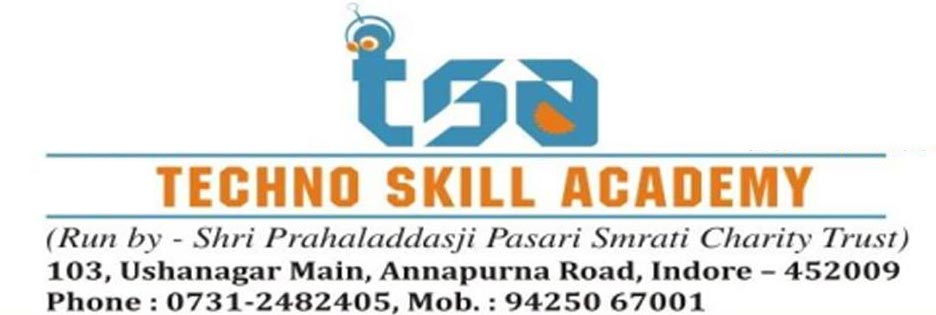Courses
Robotics

About the Robotics Course

Course Fees for School Students (6th to 12th)
Duration – 100 Hours
Fees – INR 6000/-
Eligibility – Class VI to XII

Course Fees for Engineering & Dip. Students
Duration – 6 Weeks 4 Hours a Day
Fees – INR 10000/-
Eligibility – Engineering/ Science/ ITI/ Diploma Students
Robotics Course Syllabus
Module 1
Robotics Overview
- Introduction to robotics.
- Robots intended for different applications.
- Different technologies and their practical application in Robotics
Module 2
Basic Mechanical Concept
- Importance of a design.
- Transmission systems.
- Reducers and their applications.
- Types of motors and their
Module 3
Introduction of Basic Component
- Breadboard and its usage.
- Resistor and its importance.
- Capacitors.
- Inductor and relays.
- Multimeter.
- Voltage and current dividers.
- Diodes, its types and its uses.
- Voltage regulators and their types
- Transistors as inverters and amplifiers.
Hands on Activities
- Using your Multi meter.
- Voltage divider & Voltage regulator.
- Transistor as a switch.
- Using capacitors to reduce spikes.
- Controlling a relay using a transistor.
Module 4
Sensors
- Light Dependant Resistor (LDR)
- IR photodiode
- TSOP 17XX
Hands on Activities
- Variance of resistance in LDR
- Working of TSOP1738
Module 5
Introduction to ICs
- Understanding Datasheets.
- Op-Amp applications.
- Timer circuits and their applications.
- Astable, Monostable and Bistable
- Multivibraters and their applications.
Hands on Activities
- Pin structure of an Integrated circuit.
- Making an IR sensor using Operational Amp.
- Getting delay using 555 Timer IC.
- Controlling a strip of LEDs in series.
- Controlling a device using TV remote.
Module 6
Motors and Types
- DC motor.
- Stepper Motor.
- Servo Motor.
Module 7
Motor Drivers
- H-Bridge.
- Pulse Width Modulation.
- Controlling a stepper motor.
- Controlling a servo motor.
Hands on Activities
- Braking properties of a DC motor.
- Controlling speed and direction of a DC motor using H-Bridge and 555Timer IC for PWM.
- Rotating a stepper motor using 555
- Timer IC and 4017 IC and understanding its principle.
- Controlling a servo motor using 555Timer IC.
Module 8
Circuit Designing
- Importance of circuit designing
- Different tools used for circuit designing.
- Introduction to Eagle.
- Designing a schematic.
- Tips for designing a good schematic.
Hands on Activities
- Selecting the right components.
- Adding new libraries.
- Connecting two terminals.
- Labeling the connections
Module 9
PCB Designing
- Types of PCBs.
- Techniques for decreasing the cost of production.
- Design rules.
- Getting used to measuring in mills.
Hands on Activities
- Placement of components.
- Routing your schematic.
- Changing the width of track.
- Measuring sizes in mills.
Module 10
Steps involve in manufacturing a PCB
- Different methods to make a PCB.
- Introduction to Copper Cam.
- Basics of G-Code and its importance.
- Introduction to NC Studio.
Hands on Activities
- Selecting the tools used in the milling machine.
- Overcoming the limitations of the milling machine in Copper Cam.
Module 11
The Routing Machine
- X Y and Z moment.
- Fixing the job on the machine.
- Tool selection and adjustment.
- Safety precautions.
Hands on activities:
- Safety precautions.
- Controlling the milling machine using NC Studio.
- Setting the origin.
- Selecting the tool.
- Changing the tools each time after Engraving, Drilling and cutting processes
Module 12
Soldering Techniques
- Temperature ranges.
- Oxide layer and its effects.
- SMD soldering.
- Desoldering using a blower.
- Safety precautions.
Hands on Activities
- Safety precautions.
- Getting rid of the oxide layer.
- Effective use of the soldering tip.
- Soldering and Desoldering.
Module 13
Embedded System Overview
- Introduction to Embedded system
- Introduction to various tools in embedded system industry
- Overview of AVR family of microcontroller and AVR development board.
- Introduction and importance of fuse bits.
- Boot loader and its applications.
Hands on Activities
- Compiling the code using AVR studio.
- Burning the code using Prog ISP
Module 14
Programming the 8051 development board
- GPIO Programming.
- Masking operations.
- Interfacing LCD.
- Interfacing motors.
- Interfacing with Sensors.
Hands on Activities
- LED Blink program.
- Taking inputs from Switches.
- Making a small counter and displaying the count on LCD.
- Controlling the movement of DocileX.
- Line following Robot.
- Wall following Robot.
Module 15
Inbuilt peripherals
- Introduction to timers and its modes.
- Working of different interrupts.
- EEPROM.
Hands on Activities
- Making an LED blink with the while loop empty.
- Making timers to count an event.
- Using interrupts to fire a task.
- Making a data logger.
Module 16
Communication Protocols
- Introduction to Communication
- Introduction to UART and its modes.
- Introduction to SPI.
- Introduction to wireless communication.
Hands on Activities
- Controlling a robot with PC using UART.
- Addressing using UART.
- Control a robot direction using Keypad through wired communication.
- Implement wireless communication using Xbee modules.
Talk to us!
Please feel free to get in touch with us and our Counselors will guide you with the best Course choices, based on your aptitude, interest and skill level. We are confident that you will be well prepared for the job market at the end of the course.
Techno Skill Academy
103 Usha Nagar Main, Opp. SBI
Near Mhow Naka
Annapurna Road, Indore
Madhya Pradesh, INDIA
